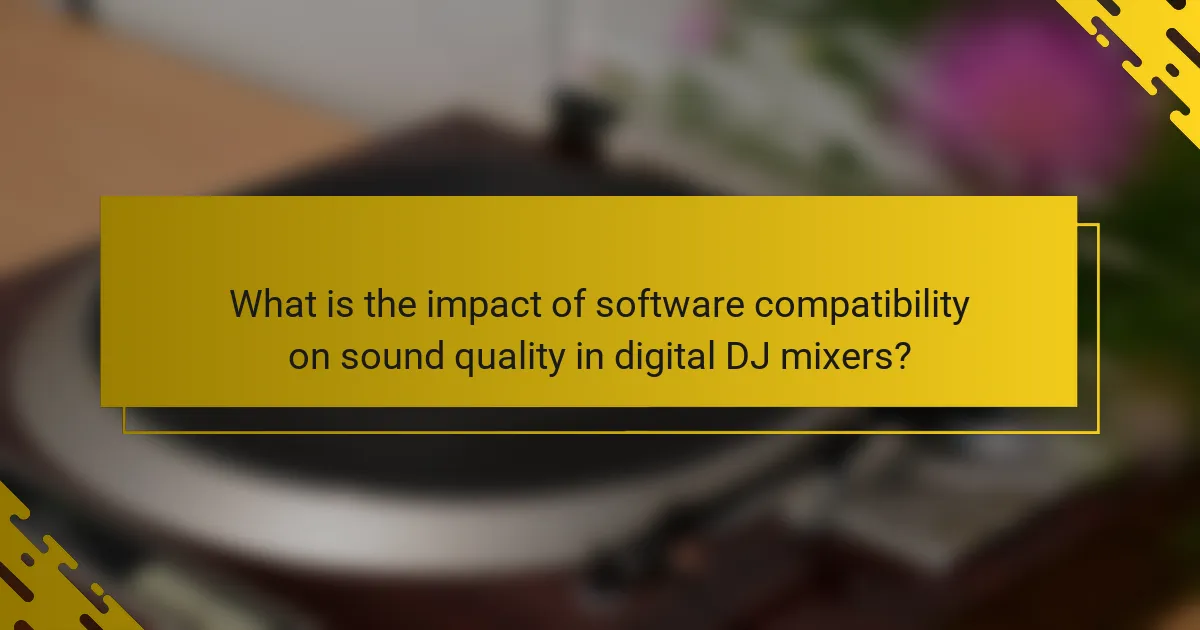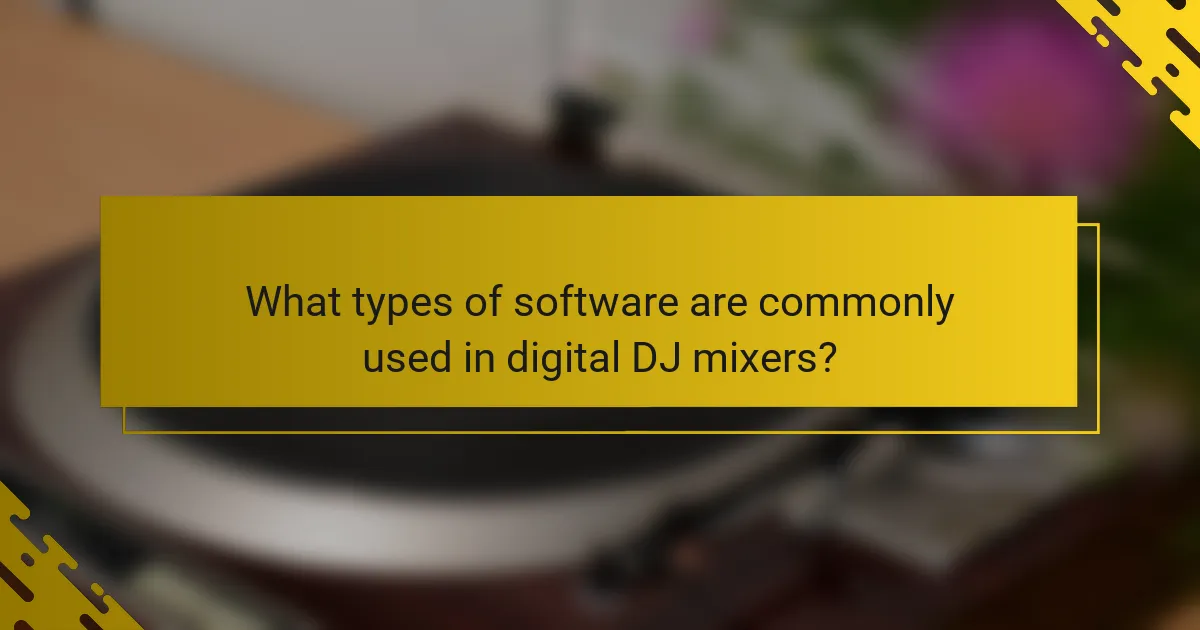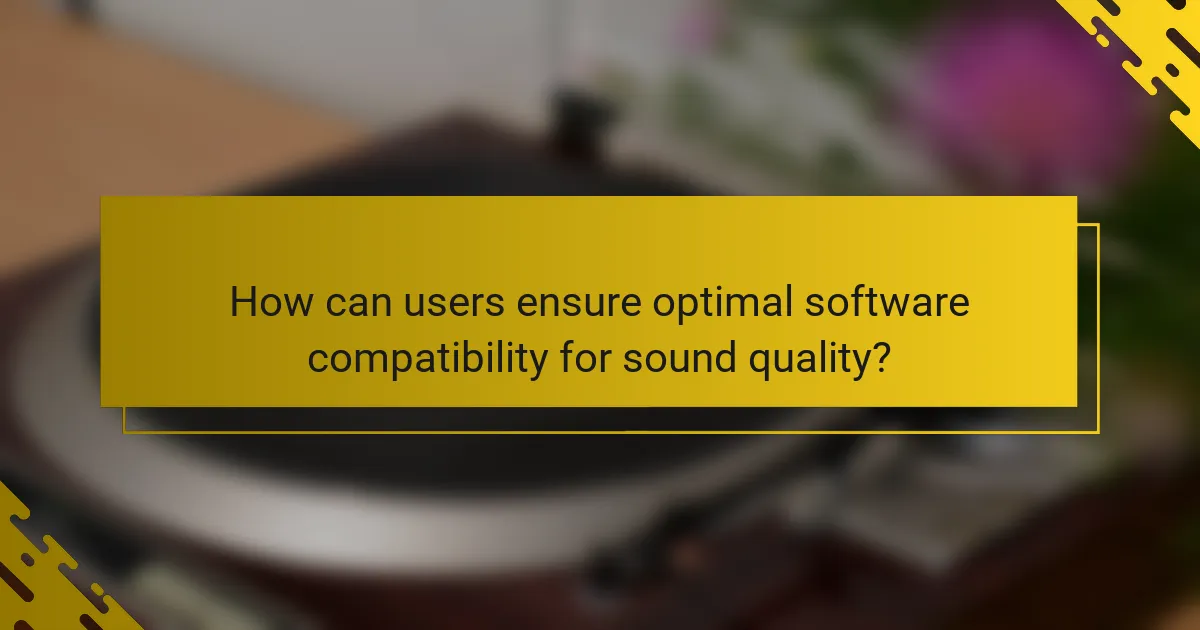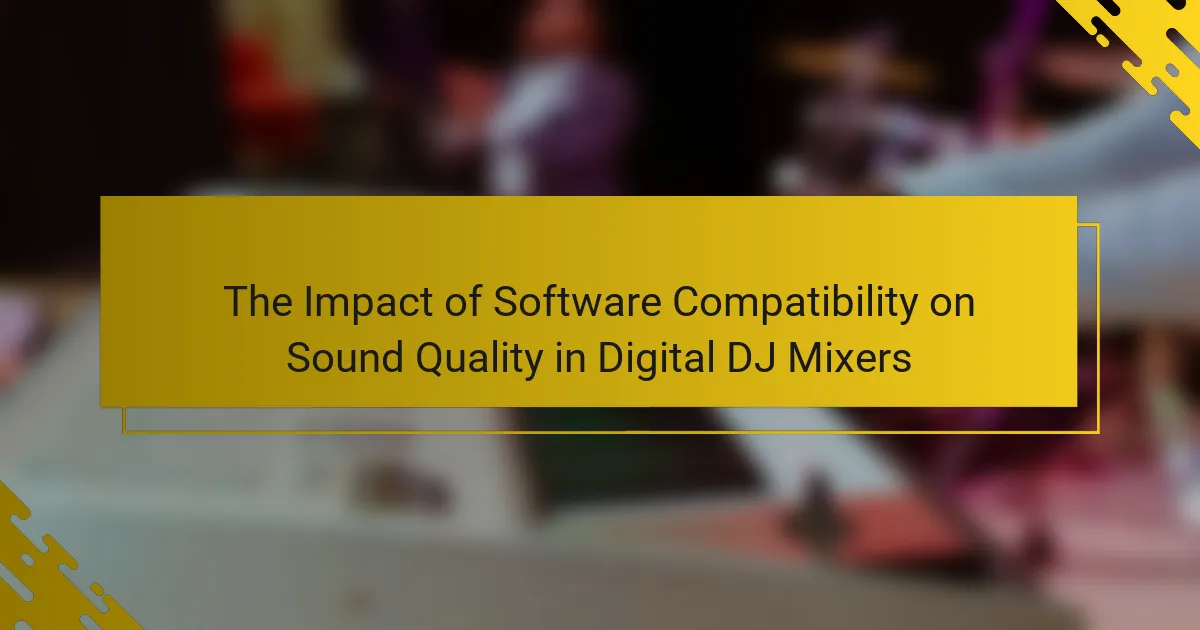Software compatibility is a critical factor influencing sound quality in digital DJ mixers. When software, such as DJ, audio editing, and performance applications, aligns with the hardware, it enhances performance and functionality. Incompatibility can lead to issues like latency, distortion, and audio artifacts that degrade the listening experience. This article explores how selecting the right software and ensuring regular updates can optimize sound quality, particularly for professional DJs who depend on clarity in their mixes. Key considerations include verifying mixer model support, testing audio settings, and utilizing recommended formats to achieve optimal compatibility and sound fidelity.

What is the impact of software compatibility on sound quality in digital DJ mixers?
Software compatibility significantly affects sound quality in digital DJ mixers. When software is compatible, it ensures optimal performance and functionality of the mixer. Incompatible software can lead to latency issues, distortion, and reduced audio fidelity.
For example, a study by DJ Tech Tools found that mismatched software can introduce audio artifacts. These artifacts degrade the overall sound experience during live performances. Additionally, compatibility affects the ability to utilize advanced features like effects and equalization.
When software and hardware work seamlessly together, sound quality is enhanced. This is crucial for professional DJs who rely on clarity and precision in their mixes. Overall, software compatibility is essential for achieving high-quality sound in digital DJ mixers.
How does software compatibility influence sound quality in digital DJ mixers?
Software compatibility significantly influences sound quality in digital DJ mixers. Compatible software ensures optimal performance and reduces latency. High-quality drivers facilitate better audio processing. Incompatible software may introduce glitches or distortions. This can degrade the overall sound output. Additionally, software updates can enhance features and sound fidelity. For instance, using a mixer with software designed for specific audio codecs improves clarity. Therefore, software compatibility is crucial for achieving superior sound quality in digital DJ mixers.
What are the key software components that affect sound quality?
The key software components that affect sound quality include digital signal processing (DSP), audio codecs, and equalizers. DSP algorithms manipulate audio signals to enhance clarity and reduce noise. Audio codecs compress and decompress audio files, impacting fidelity and latency. Equalizers adjust frequency response, allowing for tailored sound profiles. Additionally, software drivers ensure compatibility with hardware, influencing overall performance. These components collectively determine the audio output quality in digital DJ mixers.
How does the choice of software affect audio processing?
The choice of software significantly affects audio processing by determining the algorithms and features available for sound manipulation. Different software can offer varying levels of audio fidelity, latency, and processing power. For instance, some digital audio workstations (DAWs) provide advanced effects and plugins that enhance sound quality. Others may prioritize real-time performance, impacting how audio is processed during live mixing.
Additionally, software compatibility with hardware influences overall sound output. For example, certain software may optimize performance with specific digital DJ mixers, leading to clearer audio and reduced distortion. Conversely, incompatible software can introduce glitches or latency issues, degrading sound quality.
Research shows that software choices can lead to differences in audio resolution and dynamic range. A study by the Audio Engineering Society highlighted that software processing could affect the perceived loudness and clarity of audio signals. Therefore, selecting the right software is crucial for achieving optimal audio performance in digital DJ setups.
Why is software compatibility critical for digital DJ mixers?
Software compatibility is critical for digital DJ mixers because it ensures seamless integration with various music production software and hardware. This compatibility allows DJs to utilize a wide range of features and effects that enhance their performances. When software is compatible, it enables real-time audio processing and reduces latency, which is essential for live mixing. Furthermore, compatibility with popular DJ software like Serato and Traktor allows for more extensive library management and track manipulation. According to a study by DJ TechTools, 85% of professional DJs reported that software compatibility significantly improved their workflow and creativity. Thus, software compatibility directly impacts the overall sound quality and performance capabilities of digital DJ mixers.
What problems can arise from incompatible software?
Incompatible software can lead to significant operational issues. These issues often include crashes and system instability. Users may experience data loss due to improper file handling. Audio quality can degrade when software fails to communicate effectively. Latency problems may arise, impacting real-time performance. Features might not operate as intended, limiting functionality. Additionally, users may face difficulties in integrating hardware components. Compatibility issues can also hinder updates and support from developers.
How can software compatibility enhance user experience in digital DJ mixing?
Software compatibility enhances user experience in digital DJ mixing by ensuring seamless integration of various tools and platforms. It allows DJs to use their preferred software without technical issues. Compatible software enables effective communication between hardware and software components. This leads to improved functionality and performance during live sets. Enhanced user interfaces are often a result of compatibility, making navigation easier. Additionally, it allows access to a wider range of features and effects. According to a study by DJ TechTools, 85% of DJs report improved performance with compatible software. This statistic underscores the importance of software compatibility in enhancing overall user experience.

What types of software are commonly used in digital DJ mixers?
Digital DJ mixers commonly use software such as DJ software, audio editing software, and performance software. DJ software includes programs like Serato DJ, Traktor Pro, and Virtual DJ. These applications facilitate mixing, beat matching, and track selection. Audio editing software, such as Ableton Live and Adobe Audition, allows DJs to manipulate audio files and create custom tracks. Performance software enhances live performances by integrating MIDI controllers and other hardware. Compatibility with these software types directly influences sound quality and functionality in digital DJ mixers.
Which digital audio workstations (DAWs) are compatible with DJ mixers?
Ableton Live, Serato DJ, Traktor Pro, and Virtual DJ are compatible with DJ mixers. These DAWs support various audio interfaces and MIDI protocols. They allow seamless integration with hardware mixers. For instance, Serato DJ is designed specifically for DJing and works well with many mixer brands. Ableton Live offers flexible routing options for live performances. Traktor Pro is known for its powerful effects and remix capabilities. Virtual DJ provides a user-friendly interface for beginners and professionals alike. Each DAW enhances sound quality and performance when paired with compatible mixers.
What features do popular DAWs offer for DJ mixing?
Popular DAWs offer various features for DJ mixing, enhancing the mixing experience. Key features include multi-track recording, allowing DJs to layer multiple audio tracks. They provide real-time audio effects, enabling instant manipulation of sound. Many DAWs support MIDI integration for controlling virtual instruments and effects. They also include beat matching tools, which help synchronize tracks seamlessly. Looping capabilities allow DJs to repeat sections of audio effortlessly. Popular DAWs feature sample libraries, providing a range of sounds for creative mixing. Additionally, they offer automation features to control volume and effects over time. These functionalities collectively improve the overall mixing quality and workflow for DJs.
How do different DAWs impact sound quality?
Different Digital Audio Workstations (DAWs) can significantly impact sound quality. Each DAW processes audio differently, affecting clarity and depth. Some DAWs use advanced algorithms for audio rendering, enhancing overall sound fidelity. Others may introduce latency, which can degrade sound quality during playback. The sample rate and bit depth settings in each DAW also influence the final output quality. For instance, higher sample rates can capture more detail, resulting in a richer sound. Additionally, the built-in effects and plugins of a DAW can alter the tonal balance and dynamic range of the audio. DAWs with better audio engines typically provide superior sound quality. Therefore, the choice of DAW can be crucial for achieving desired sound characteristics in digital DJ mixing.
What role do plugins play in enhancing sound quality?
Plugins enhance sound quality by processing audio signals through various effects and adjustments. They can add reverb, equalization, compression, and other sound modifications. Each plugin serves a specific purpose, improving clarity, depth, and overall tonal balance. For instance, equalizer plugins can refine frequency ranges to eliminate muddiness. Compression plugins control dynamic range, making sounds more consistent. Additionally, plugins can simulate analog equipment, adding warmth and character to digital audio. Studies show that high-quality plugins can significantly improve the perceived audio quality in digital mixing environments.
Which types of plugins are most beneficial for DJ mixers?
Audio effects plugins are most beneficial for DJ mixers. These plugins include equalizers, compressors, and reverb effects. Equalizers allow DJs to adjust frequency levels for optimal sound. Compressors help maintain consistent audio levels during transitions. Reverb effects add depth and ambiance to tracks. Additionally, virtual instruments can enhance live performances. These plugins improve overall sound quality and creativity. Research shows that quality plugins significantly impact mixing outcomes. DJs often rely on specific software compatibility for optimal performance.
How can plugins improve sound processing in digital DJ setups?
Plugins can enhance sound processing in digital DJ setups by providing advanced audio effects and tools. They offer features like equalization, compression, and reverb, which can significantly improve sound quality. Many plugins allow for real-time audio manipulation, enabling DJs to customize their mixes dynamically. Additionally, plugins can introduce unique sound textures and creative possibilities that are not available in standard software. Research indicates that using high-quality plugins can lead to a more polished and professional sound output. For instance, studies show that professional DJs often rely on specialized plugins to achieve specific sound characteristics. This reliance highlights the importance of software compatibility in maximizing sound quality in digital DJ mixers.

How can users ensure optimal software compatibility for sound quality?
Users can ensure optimal software compatibility for sound quality by selecting the appropriate software for their digital DJ mixers. They should verify that the software supports their mixer model and is designed for high-quality audio processing. Updating software regularly is crucial, as manufacturers often release patches that enhance performance and compatibility. Users should also check for driver updates specific to their audio interface. Testing different audio settings within the software can help identify the best configurations for sound quality. Utilizing recommended audio formats and sample rates ensures better compatibility. Additionally, consulting user manuals and manufacturer websites provides valuable compatibility information. Following these steps leads to improved sound quality in digital DJ mixing.
What best practices should DJs follow for software compatibility?
DJs should ensure their software is compatible with their hardware. This includes checking system requirements before installation. DJs must also keep their software updated to avoid bugs and improve performance. Using widely supported formats enhances compatibility across different systems. Regularly backing up settings and libraries prevents data loss during updates. Testing software in a controlled environment before live performances minimizes risks. Reading user reviews and forums can provide insights into compatibility issues. Finally, maintaining a consistent software ecosystem reduces the likelihood of conflicts during performances.
How can regular updates improve software performance?
Regular updates can improve software performance by fixing bugs and enhancing features. These updates often address security vulnerabilities that can slow down software. They also optimize code, which can lead to faster processing speeds. Furthermore, updates can introduce new functionalities that improve user experience. For example, a study by the National Institute of Standards and Technology found that regular updates can reduce system crashes by up to 30%. This stability directly contributes to better software performance. Additionally, updates can ensure compatibility with new hardware, further enhancing overall efficiency.
What troubleshooting steps can DJs take for software issues?
DJs can take several troubleshooting steps for software issues. First, they should restart the software to resolve temporary glitches. Next, checking for software updates can fix known bugs and improve performance. DJs should also verify that their hardware is compatible with the software version. Additionally, reviewing the audio settings can help ensure proper configuration. Running the software as an administrator can also resolve permission-related issues. If problems persist, reinstalling the software may be necessary. Finally, consulting the software’s support resources can provide specific solutions for common issues.
What are common misconceptions about software compatibility and sound quality?
Common misconceptions about software compatibility and sound quality include the belief that all software versions work equally well with any hardware. In reality, specific software may optimize sound quality based on compatibility with particular hardware. Another misconception is that higher sound quality is solely dependent on software. However, hardware capabilities also play a critical role in sound output. Some users think that outdated software will not affect sound quality. In fact, updates often include enhancements that improve audio performance. Additionally, many believe that any digital audio format will yield the same sound quality. In truth, the format and bitrate can significantly impact audio fidelity. Lastly, there is a misconception that using multiple software applications simultaneously does not affect sound quality. This can lead to latency issues and decreased performance in audio processing.
How does the hardware influence software compatibility?
Hardware significantly influences software compatibility by determining the system requirements needed for software to function correctly. Each software application has specific hardware requirements, including processor speed, memory, and storage capacity. If the hardware does not meet these requirements, the software may not install or run properly. For example, a digital DJ mixer may require a certain type of audio interface to ensure optimal performance. Additionally, hardware drivers play a crucial role in facilitating communication between the software and the hardware components. Incompatibility between drivers and hardware can lead to performance issues or malfunctions. Therefore, the specifications of hardware directly affect the usability and functionality of software applications, particularly in specialized fields like digital DJ mixing.
What myths should DJs avoid regarding software and sound quality?
DJs should avoid the myth that all DJ software produces the same sound quality. Different software applications utilize varying algorithms for audio processing. This can significantly impact the final output sound. Another myth is that higher sample rates always yield better sound quality. In many cases, the difference may be negligible to the average listener. DJs often believe that using more effects automatically enhances sound quality. Overuse of effects can lead to a muddied mix instead. Additionally, some think that hardware quality is irrelevant if using top-tier software. However, poor hardware can still limit sound performance. Lastly, the belief that all digital formats sound the same is misleading. Lossless formats retain more audio detail than compressed formats.
What practical tips can enhance sound quality through software compatibility?
To enhance sound quality through software compatibility, ensure that all software and drivers are up to date. Regular updates fix bugs and improve performance. Use high-quality audio formats, such as WAV or FLAC, instead of compressed formats like MP3. This preserves audio fidelity. Optimize buffer size settings in audio software to reduce latency while maintaining sound quality. A smaller buffer size can improve responsiveness, but too small may lead to glitches. Choose a digital audio workstation (DAW) that supports high-resolution audio processing. This allows for better sound manipulation. Finally, utilize audio plugins that are designed for your specific hardware. This ensures compatibility and maximizes sound quality.
The main entity of this article is software compatibility in digital DJ mixers. The article explores how software compatibility influences sound quality, detailing its effects on audio fidelity, latency, and functionality during live performances. It discusses key software components that impact sound quality, the role of digital audio workstations (DAWs) and plugins, and best practices for ensuring optimal compatibility. Additionally, it addresses common misconceptions and provides practical tips for enhancing sound quality through software compatibility, emphasizing the importance of selecting appropriate software and keeping it updated for professional DJing.
